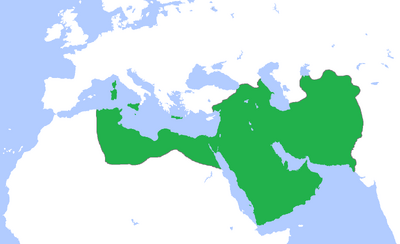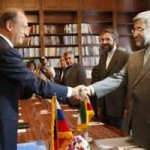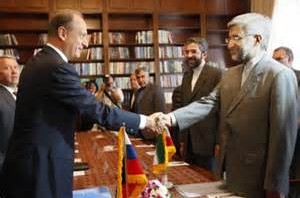It is happening, the world leaders are posturing for a post American influenced globe. Allies and adversaries alike are quite busy expanding ties, agreements and business deals with each other that leave the United States virtually out of the mix and with purpose, world leaders no longer trust or can rely on America. Sad but true.
There is the matter of the Muslim Brotherhood getting huge support from a turn-coat previous president, Jimmy Carter.
China is partnering with Sudan offering weapons. Vladimir Putin is back in Cuba expanding his global reach again. Angela Merkel is angry with the United States over the NSA spying on her cell phone and on German citizens. But additionally in the past two weeks, German intelligence nabbed two Germans working for the CIA and Merkel terminated our CIA station in Berlin. But why were we spying on Germany? Seems, Germany too has deep ties with Iran and Russia.
France is selling warships to Russia against the position of the United States. Because the White House, previously Hillary Clinton and now John Kerry have failed in halting the nuclear weapons program of Iran, Israel and Saudi Arabia have teamed up with a strategy.
Italy has recently signed deals with Russia. Russia has an arms deal with Greece and a gas pipeline deal with Russia.
After the United States exit from Iraq, Maliki turned to Russia and Iran for protection from ISIS. After all the blood and treasure spent by the American forces in Iraq, Maliki no longer wants the United States due to Barack Obama shunning all requests by Maliki.
Russia is working again the Latin America component where the United States has ignored Brazil and hidden deals in Nicaragua among others.
Even the rather neutral country of Switzerland has suspended sanctions against Iran.
Qatar, Kuwait and many others have taken a late, very late position in Syria, where the United States dropped any mission four years ago in dealing with Assad.
VP, Joe Biden showed up in Ukraine to show support against Russian aggression but that has fallen short with any real evidence of solutions. All reliance has fallen to NATO to solve the matter of Russia occupying Crimea and Ukraine and the threat moves towards several Baltic States, so again, America is absent except for token gestures of training small military units.
Under Barack Obama, the influence and diplomacy agenda worldwide has been shrinking. Take Afghanistan and Iraq. Then there is Europe.
Why U.S. Bases in Europe Remain Vital by Luke Coffey
Executive Summary
As part of a policy that is shrinking America’s military presence in the world, the Obama Administration’s recent defense cuts heavily impact the U.S. military footprint in Europe. These cuts are sending the wrong signal on America’s commitment to transatlantic security and will embolden U.S. adversaries in the Euro–Atlantic region. Most importantly, the cuts will reduce the ability and flexibility of the U.S. to react to the unexpected in Eurasia and the Middle East.
A Shrinking Force Posture. On January 26, 2012 the Pentagon announced reductions of U.S. military forces in Europe as part of the latest round of defense cuts:
- Inactivation of one A-10 squadron at Spangdahlem Air Base, Germany, in 2013.
- Inactivation of the 603rd Air Control Squadron at Aviano Air Base, Italy, in 2013.
- Reduction of V Corps headquarters structure after deployment to Afghanistan later this year. It will not return to Europe.
- Inactivation of the 170th Brigade Combat Team (BCT) in 2013 and the 172nd BCT in 2014—a reduction of more than 8,000 soldiers.
- An additional reduction of approximately 2,500 soldiers in enabling units of the U.S. Army in Europe over the next five years.
U.S. Forces in Europe. Today, the U.S. has approximately 80,000 military personnel in 28 main operating bases in Europe, primarily in Germany, Italy, the United Kingdom, and Spain. These forces include four BCTs, which form the backbone of U.S. ground capability in Europe.
Some believe that basing U.S. troops in Europe is a Cold War anachronism, but forward basing U.S. troops in Europe is just as important today as it was during the Cold War, albeit for different reasons. The U.S. military presence in Europe helps to achieve American policy aims in the broader Eurasia and Middle East regions. From the Arctic to the Levant, from the Maghreb to the Caucasus, Europe is at one of the most important crossroads of the world. U.S. military bases in Europe provide American leaders with increased flexibility, resilience, and options in a dangerous world. The garrisons of American service personnel in Europe are no longer the fortresses of the Cold War, but the forward operating bases of the 21st century.
America’s Interests. A safe and secure Europe is in America’s financial interest. Regional security means economic viability. The economies of the 27 member states of the European Union, along with the U.S. economy, account for approximately half of the global economy.
A relevant and strong NATO is also in America’s interest. U.S. forces play a major role in the capacity building of key European allies. This has huge benefits for the United States. In 2010, the U.S. carried out 33 major multinational training exercises involving 50,000 troops from 40 countries in Europe. U.S. forces also help European allies to prepare for missions such as the one in Afghanistan. For example, a Georgian infantry battalion is fighting alongside U.S. Marines in Helmand Province, one of the most dangerous parts of Afghanistan. The more America trains its allies to carry out challenging missions, the more they can share the burden.
Cost-Driven Reductions. Perceived financial savings, not an empirical or strategic review of U.S. force requirements, appear to have driven the decision to reduce the U.S. military footprint in Europe. On April 8, 2011, the Obama Administration announced that it was modifying a 2004 decision to remove two of the four BCTs from Europe and would bring only one BCT back to the United States. In January 2012, the Administration reversed itself, stating that two BCTs would return from Europe. However, the Administration did not explain what had changed in the geostrategic picture of Europe or in the advice from U.S. allies since last April to prompt this reversal. This indicates that defense cuts, not strategy, are driving the decision.
The Red Herring of Perceived Financial Savings. Proponents cite savings as the main reason to reduce U.S. bases in Europe. This is clearly the rationale behind the Obama Administration’s recent decision. This is dangerous, shortsighted, and based on the false assumption that the U.S. can project the same degree of power with rotational forces as it currently does with troops permanently based in Europe. Under current plans, more than 10,000 soldiers will leave Europe and be replaced by a maximum of one battalion rotating through Europe for training. Furthermore, most savings estimates exclude the cost of building new infrastructure in the U.S. for any returning units, the up-front cost of closing down facilities in Europe, the cost of rotating units between the U.S. and Europe, and the strain this would exert on the smaller army that the Obama Administration is proposing.
Time for U.S. Leadership. Instead, the White House should:
- Put America’s national security interests ahead of defense cuts. Important decisions, such as the number of bases and the troop strength, should follow from a strategic review of U.S. interests in Europe, not the desire to slash the defense budget to find savings.
- Show U.S. commitment to NATO and Euro–Atlantic security. The U.S. troop presence in Europe is the most visible sign of U.S. support to NATO. As NATO transforms for the 21st century, it needs American leadership and commitment.
- Be honest and open with European allies. The Obama Administration needs to consult with key European allies and with the broader NATO alliance before making decisions on U.S. troop reductions in Europe.
- Reward key U.S. allies with closer defense cooperation. Instead of reducing the numbers of U.S. military bases in Europe, the U.S. should consider establishing new bases in Europe, especially on the periphery and with allies who have demonstrated a strong commitment to Euro–Atlantic security, such as Georgia.
Conclusion. The U.S. military presence in Europe deters American adversaries, strengthens allies, and protects U.S. interests. Whether preparing U.S. and allied troops for Afghanistan or responding to a humanitarian crisis in the region, the U.S. can project power and react to the unexpected because of its forward-based military capabilities in Europe. Reducing these capabilities will only weaken America on the world stage.





